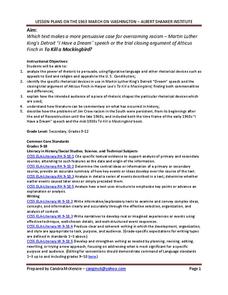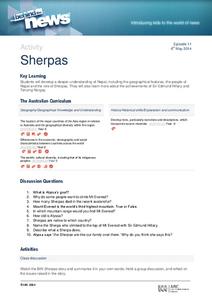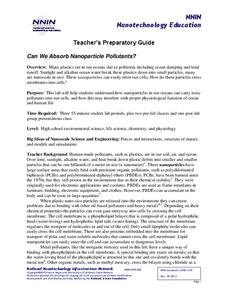Albert Shanker Institute
Making the Case for Equality: A Comparison
Martin Luther King Jr's " I Have a Dream" speech and Atticus Finch's closing argument during the trial of Tom Robinson both address the societal need to overcome racism. After examining the rhetorical devices and figurative language used...
Australian Broadcasting Cooperation
Sherpas
Climbing Mount Everest is a dream for many mountaineers, and for a lucky few, it's a hard-fought accomplishment. Learn more about the important role Sherpas play in Mount Everest expeditions, including Sir Edmund Hillary's famous...
National Nanotechnology Infrastructure Network
Can We Absorb Nanoparticle Pollutants?
Just because we can't see it doesn't mean it isn't there! A growing concern for environmental scientists is toxic nanoparticles in our air and water. Young scholars conduct an experiment to demonstrate how these particles can cross our...
American Psychological Association
Research Ethics
Psychologists designing experiments to research human behavior must consider weighty ethical concerns. Class members act as members of an institutional review board and examine proposals to determine whether included provisions...
US Holocaust Museum
Nazi Olympics: Berlin 1936
The Olympics are about more than sports—at times, the games are also a place of racism and prejudice! Pupils investigate the 1936 Olympics in Berlin, Germany. They analyze the meaning behind the materials included in the United States...
Film Space
Whale Rider
Ready for an educational movie day? Use a resource based on the movie Whale Rider to learn more about the Maori culture. Class members answer a variety of questions and listen to music from the soundtrack to further analyze and...
EngageNY
TASC Transition Curriculum: Workshop 12
How can opinions slant facts? Workshop participants learn how to examine primary and secondary sources and identify the author's point of view. They also examine how visual art impacts the meaning and rhetoric of sources. Full of...
California Academy of Science
Rapid Brainstorming: How Can We Conserve Our Water Resources?
Water covers around 75 percent of the earth, yet humans struggle to find enough fresh water to live. The fourth of 10 lessons focusing on Fresh Solutions requires brainstorming. Young scientists consider various problems related to fresh...
California Academy of Science
Exploring the Impacts of Feeding the World
Approximately 50 percent of people in the world who are chronically hungry work in agriculture. While it seems counter-intuitive, the farther you live from a farm, the more food options are available. Scholars explore concepts related to...
Newseum
E.S.C.A.P.E. Junk News
Fair, balanced, and reputable information? There's an acronym for that! Scholars learn the E.S.C.A.P.E. method for evaluating news sources. Then, pupils work in small groups to read and analyze a news story and discuss the activity to...
Federal Reserve Bank
Once Upon a Dime: High School Lesson Plan
Who knew that fairy tales and economics go hand-in-hand? Pupils complete a host of handouts, using everything from graphic organizers to short answer questions to reinforce concepts. They also complete a project that builds on everything...
Serendip
Evolution of Fur Color in Mice – Mutation, Environment and Natural Selection
Most species of animals include a variety of fur or hair color, but why? Scholars watch a video about a changing environment for mice. As the rocks around them change hues, different colors of mice begin to thrive. Discussion questions...
Read Write Think
Poetry Portfolios: Using Poetry to Teach Reading
Over the course of five periods, scholars create a poetry portfolio. They begin with a reading of the poem, Firefly. With a focus on vocabulary, learners reread the poem then look for sight words and other skills.
Houghton Mifflin Harcourt
Walt Whitman: From Song of Myself
Looking for a resource that models how to read and analyze a poem? Check out this packet that uses sections of Walt Whitman's "Song of Myself" to demonstrate how to paraphrase, note literary elements, and identify the poet's inferences.
Judicial Learning Center
The Bill of Rights and Civil Liberties
Why is the Bill of Rights so important to American's civil liberties? An important resource helps scholars find these answers and more by reading through state and federal constitutions to discover their own civil liberties. The activity...
Judicial Learning Center
Article III WebQuest
Why is Article III of the constitution so significant? Pupils discover the importance of Article III and how it relates to past as well as current events by completing Internet research using a provided handout. They learn everything...
Ford's Theatre
A Comparison of Lincoln’s Inaugural Addresses
Speech, speech! Analyzing speeches is no easy task. High schoolers learn the important process of annotation as they work together to analyze Lincoln's inaugural address. Then groups of four work to annotate a second speech at a more...
PBS
The Meaning of the Fourteenth Amendment
The Fourteenth Amendment was extremely important to civil rights and is a crucial one to remember. The resource teaches about the Supreme Court decisions related to the amendment through writing exercises, reading, and working in small...
PBS
Extranjeros and Expansion
A three-part lesson plan gives light to the Unites States expansion from the view of Texans, New Mexicans, and Californians. Through videos and written activities, scholars work collaboratively to research specific individuals and their...
National Woman's History Museum
Hedy Lamarr, An Inventive Mind
Hedy Lamarr led a double life. Best known as an actress, Lamarr was also a brilliant inventor, responsible for the technology found in Wi-Fi, GPS, and Bluetooth. After studying primary and secondary source materials, groups conduct an...
National Woman's History Museum
Defying British Rule: Women's Contributions to The American Revolution
Primary and secondary sources are the focus of a lesson that showcases the important role women played during the American Revolution. Pairs review sources and discuss their findings. A close-reading of an informational text leads the...
National Woman's History Museum
Tea with Penelope: A 2-Point Perspective of the Edenton Tea Party
A brief introduction to Penelope Barker sets the stage for a discussion about political cartoons and the persuasive technique used to create them. A graphic organizer aids scholars in the analysis of a piece of work using a 2-point...
World History Digital Education Foundation, Inc.
COVID-19: Globalization and Economic Impact
How does COVID-19 affect a global economy? The final installment in a three-part series explores the economic impact of the illness on a global scale. High school historians discuss globalization and analyze sources of data to understand...
Teaching Tolerance
Using Photographs to Teach Social Justice | Exposing Racism
Photographs capture a moment in time. And some of the best pictures demand that viewers not only ask questions about why the photo packs such an emotional wallop, but also about what happened before and after it was taken. A photograph...
Other popular searches
- Homework Help
- Homework Help and Study Guides
- Creative Writing Homework
- Ratio Tables Homework Help
- Homework Help History
- Health Homework Help
- Reading Homework
- Math Homework
- Math Homework Help
- Homework Help Lessons
- Homework Log
- Reading Homework Packets























